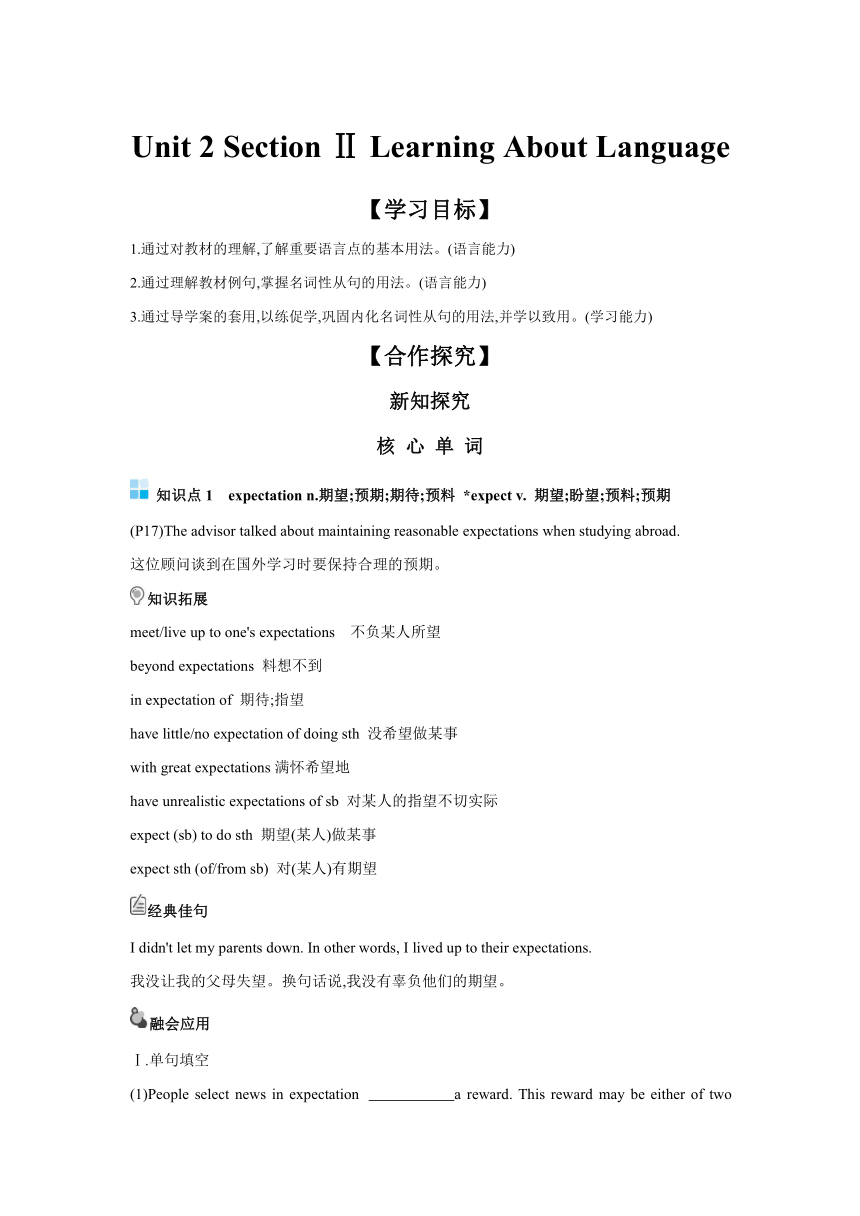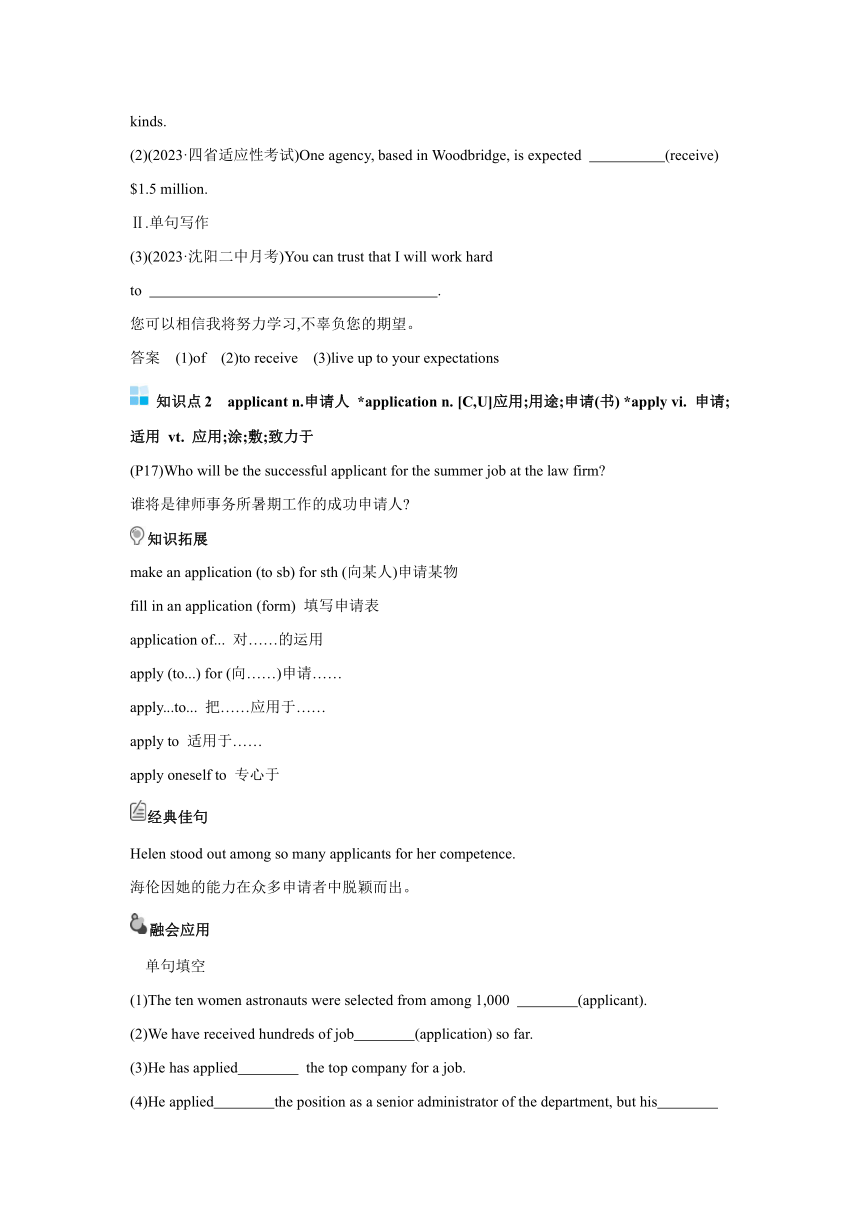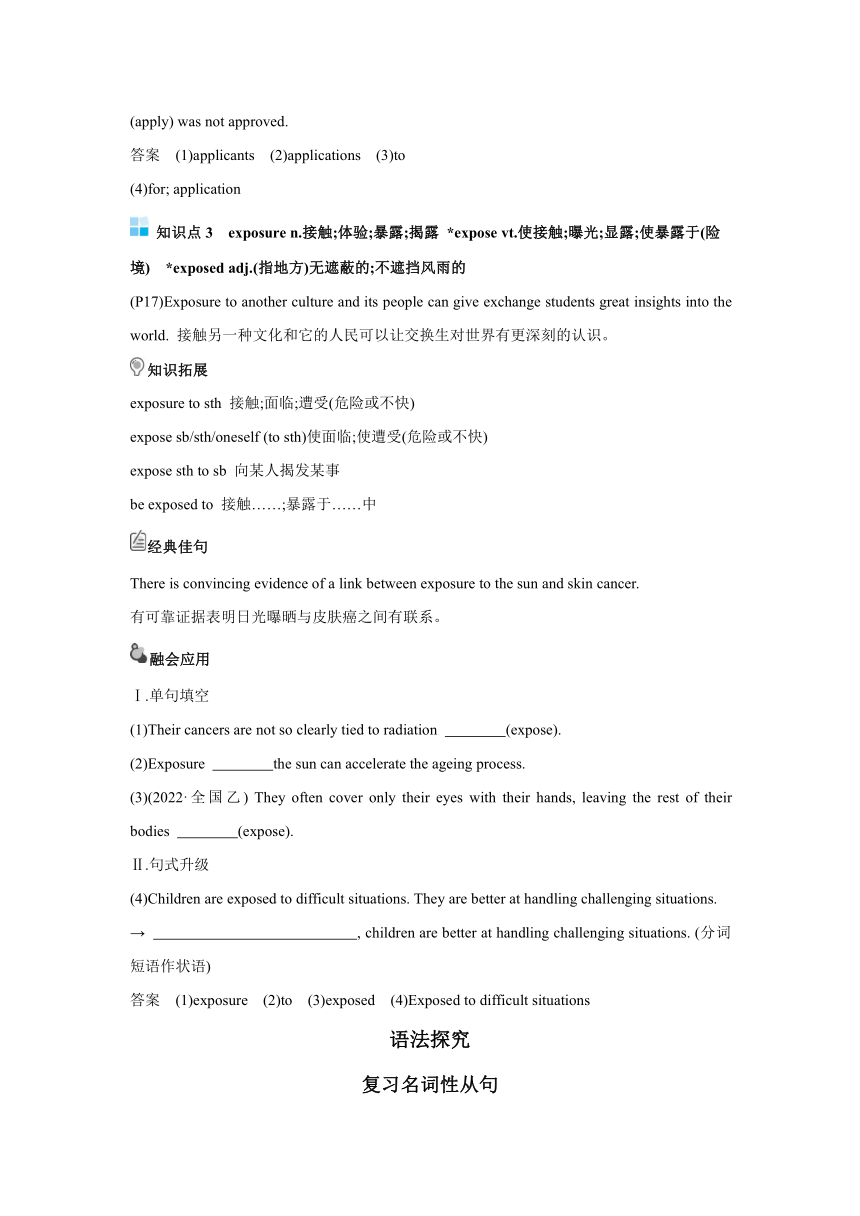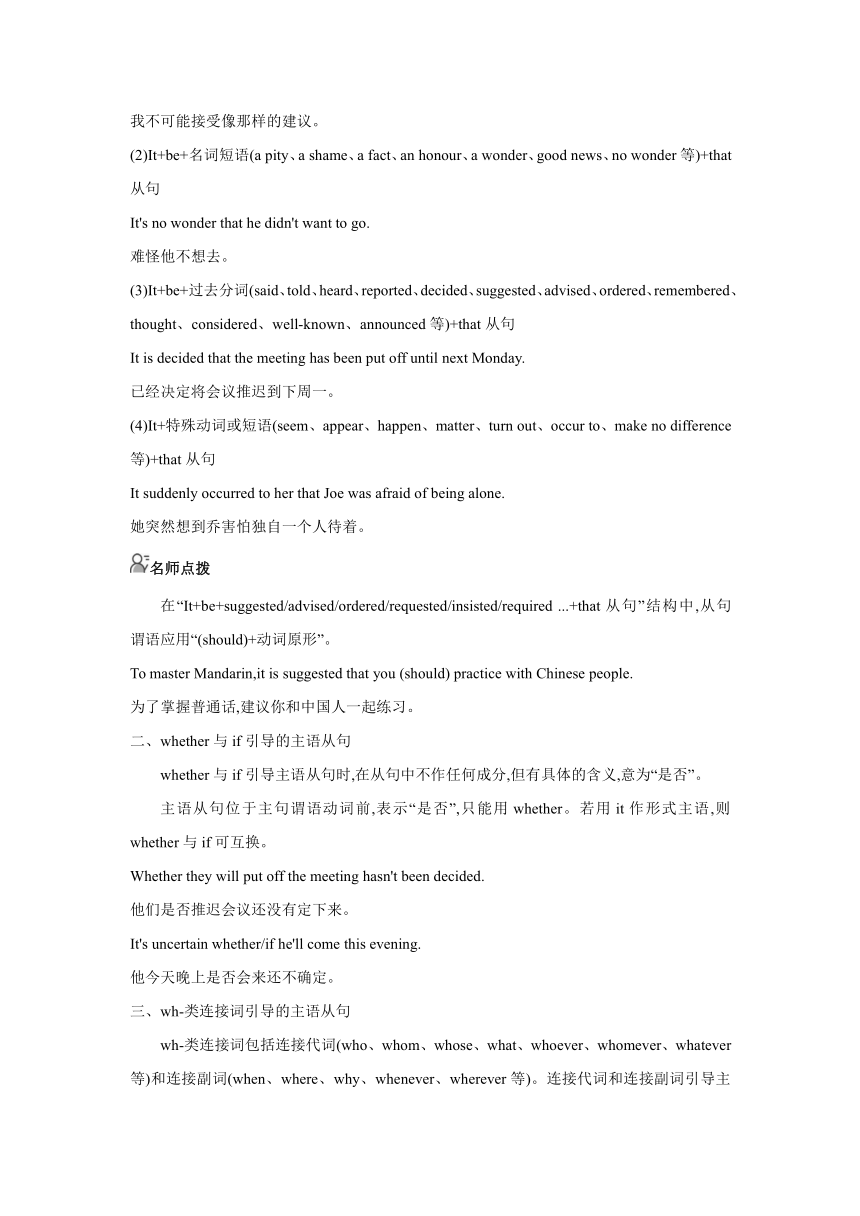人教版(2019)选择性必修 第二册Unit 2 Bridging Cultures Using Language 学案(含答案)
文档属性
| 名称 | 人教版(2019)选择性必修 第二册Unit 2 Bridging Cultures Using Language 学案(含答案) |

|
|
| 格式 | docx | ||
| 文件大小 | 49.6KB | ||
| 资源类型 | 教案 | ||
| 版本资源 | 人教版(2019) | ||
| 科目 | 英语 | ||
| 更新时间 | 2024-04-07 00:00:00 | ||
图片预览





文档简介
Unit 2 Section Ⅱ Learning About Language
【学习目标】
1.通过对教材的理解,了解重要语言点的基本用法。(语言能力)
2.通过理解教材例句,掌握名词性从句的用法。(语言能力)
3.通过导学案的套用,以练促学,巩固内化名词性从句的用法,并学以致用。(学习能力)
【合作探究】
新知探究
核 心 单 词
知识点1 expectation n.期望;预期;期待;预料 *expect v. 期望;盼望;预料;预期
(P17)The advisor talked about maintaining reasonable expectations when studying abroad.
这位顾问谈到在国外学习时要保持合理的预期。
知识拓展
meet/live up to one's expectations 不负某人所望
beyond expectations 料想不到
in expectation of 期待;指望
have little/no expectation of doing sth 没希望做某事
with great expectations满怀希望地
have unrealistic expectations of sb 对某人的指望不切实际
expect (sb) to do sth 期望(某人)做某事
expect sth (of/from sb) 对(某人)有期望
经典佳句
I didn't let my parents down. In other words, I lived up to their expectations.
我没让我的父母失望。换句话说,我没有辜负他们的期望。
融会应用
Ⅰ.单句填空
(1)People select news in expectation a reward. This reward may be either of two kinds.
(2)(2023·四省适应性考试)One agency, based in Woodbridge, is expected (receive) $1.5 million.
Ⅱ.单句写作
(3)(2023·沈阳二中月考)You can trust that I will work hard to .
您可以相信我将努力学习,不辜负您的期望。
答案 (1)of (2)to receive (3)live up to your expectations
知识点2 applicant n.申请人 *application n. [C,U]应用;用途;申请(书) *apply vi. 申请;适用 vt. 应用;涂;敷;致力于
(P17)Who will be the successful applicant for the summer job at the law firm
谁将是律师事务所暑期工作的成功申请人
知识拓展
make an application (to sb) for sth (向某人)申请某物
fill in an application (form) 填写申请表
application of... 对……的运用
apply (to...) for (向……)申请……
apply...to... 把……应用于……
apply to 适用于……
apply oneself to 专心于
经典佳句
Helen stood out among so many applicants for her competence.
海伦因她的能力在众多申请者中脱颖而出。
融会应用
单句填空
(1)The ten women astronauts were selected from among 1,000 (applicant).
(2)We have received hundreds of job (application) so far.
(3)He has applied the top company for a job.
(4)He applied the position as a senior administrator of the department, but his (apply) was not approved.
答案 (1)applicants (2)applications (3)to
(4)for; application
知识点3 exposure n.接触;体验;暴露;揭露 *expose vt.使接触;曝光;显露;使暴露于(险境) *exposed adj.(指地方)无遮蔽的;不遮挡风雨的
(P17)Exposure to another culture and its people can give exchange students great insights into the world. 接触另一种文化和它的人民可以让交换生对世界有更深刻的认识。
知识拓展
exposure to sth 接触;面临;遭受(危险或不快)
expose sb/sth/oneself (to sth)使面临;使遭受(危险或不快)
expose sth to sb 向某人揭发某事
be exposed to 接触……;暴露于……中
经典佳句
There is convincing evidence of a link between exposure to the sun and skin cancer.
有可靠证据表明日光曝晒与皮肤癌之间有联系。
融会应用
Ⅰ.单句填空
(1)Their cancers are not so clearly tied to radiation (expose).
(2)Exposure the sun can accelerate the ageing process.
(3)(2022·全国乙) They often cover only their eyes with their hands, leaving the rest of their bodies (expose).
Ⅱ.句式升级
(4)Children are exposed to difficult situations. They are better at handling challenging situations.
→ , children are better at handling challenging situations. (分词短语作状语)
答案 (1)exposure (2)to (3)exposed (4)Exposed to difficult situations
语法探究
复习名词性从句
自主探究
阅读下列句子,并注意黑体部分的用法。
1.Laura says she always feels hungry when she smells it, so I taught her how to cook it,too.
2.The first time that she had to write an essay,her tutor explained that she must acknowledge what other people had said if she cited their ideas, but that he mainly wanted to know what she thought!
3.Xie Lei was confused because she thought she knew less than other people.
4.At first, Xie Lei had no idea what she should say,but what surprised her was that she found herself speaking up in class after just a few weeks.
5.What seemed strange before now appears quite normal to her.
我的发现
(1)句1中 she always feels hungry是省略that的 。
(2)句2中黑体部分的四个引导词引导的是 。
(3)句3中she knew less than other people是省略that的 ,作thought的 。
(4)句4中第一个what引导的是 ;第二个what引导的是 ;that引导的是 。
(5)句5中What引导的是 。
答案 (1)宾语从句 (2)宾语从句 (3)宾语从句;宾语 (4)同位语从句;主语从句;表语从句 (5)主语从句
探究点1 主语从句
一、that引导的主语从句
1.that引导主语从句时,在从句中不作任何成分,也没有意义,但不可省略。
That the earth goes around the sun is known to us all.
众所周知,地球围着太阳转。
2.that引导主语从句时可用it作形式主语,把that引导的主语从句后置,that不可省略。常见句式主要有以下几种:
(1)It+be+形容词(necessary、right、likely、unlikely、wrong、important、certain、clear、obvious、strange、normal等)+that从句
It isn't likely that I should accept such an offer as that.
我不可能接受像那样的建议。
(2)It+be+名词短语(a pity、a shame、a fact、an honour、a wonder、good news、no wonder等)+that从句
It's no wonder that he didn't want to go.
难怪他不想去。
(3)It+be+过去分词(said、told、heard、reported、decided、suggested、advised、ordered、remembered、thought、considered、well-known、announced等)+that从句
It is decided that the meeting has been put off until next Monday.
已经决定将会议推迟到下周一。
(4)It+特殊动词或短语(seem、appear、happen、matter、turn out、occur to、make no difference等)+that从句
It suddenly occurred to her that Joe was afraid of being alone.
她突然想到乔害怕独自一个人待着。
名师点拨
在“It+be+suggested/advised/ordered/requested/insisted/required ...+that从句”结构中,从句谓语应用“(should)+动词原形”。
To master Mandarin,it is suggested that you (should) practice with Chinese people.
为了掌握普通话,建议你和中国人一起练习。
二、whether与if引导的主语从句
whether与if引导主语从句时,在从句中不作任何成分,但有具体的含义,意为“是否”。
主语从句位于主句谓语动词前,表示“是否”,只能用whether。若用it作形式主语,则whether与if可互换。
Whether they will put off the meeting hasn't been decided.
他们是否推迟会议还没有定下来。
It's uncertain whether/if he'll come this evening.
他今天晚上是否会来还不确定。
三、wh-类连接词引导的主语从句
wh-类连接词包括连接代词(who、whom、whose、what、whoever、whomever、whatever等)和连接副词(when、where、why、whenever、wherever等)。连接代词和连接副词引导主语从句时既充当句子成分又有具体意义,且不可省略。
What Barbara Jones offers to her fans is honesty and happiness.
芭芭拉·琼斯展现给她的粉丝们的是诚实和快乐。
Whoever breaks the school windows will be punished.
无论谁打破了学校的窗户,都要受罚。
融会应用
Ⅰ.单句写作
(1) makes no difference.
我们在哪儿开会都无所谓。
(2) is not certain now.
运动会是否会举行现在还不确定。
Ⅱ.句式转换
(3)That she will do well in her exam is certain.
→ (主语从句)
答案 (1)Where we shall have the meeting
(2)Whether the sports meet will be held (3)It is certain that she will do well in her exam.
探究点2 宾语从句
一、that引导的宾语从句
that引导宾语从句时在从句中不作任何成分,也没有意义,口语中一般可以省略,但在下列情况中不能省略:
1.当that从句作介词的宾语时。
I don't know exactly where he lives,except that it's somewhere out in the wilds.
我不是很清楚他住在哪里,只知道是在远离城市的荒野之中。
2.动词后跟有多个that引导的宾语从句时,只有第一个that可以省略,从第二个从句开始that不可省略。
He told me (that) he had to leave and that he would be back soon.
他告诉我他不得不离开并且很快就会回来。
3.it作形式宾语的宾语从句。
(1)一些接宾语补足语的动词,其后接宾语从句时,则需要用it作形式宾语,而将that引导的宾语从句后置。常见的这类动词有find、think、consider、believe、guess、suppose、make等。
He has made it clear that the meeting will not be postponed.
他清楚地表明会议不会被推迟。
(2)hate、like、dislike、appreciate、enjoy等表示“喜欢”“厌恶”的动词以及一些动词短语see to、depend on、rely on等后面常用it作形式宾语,而将宾语从句后置。
I shall see to it that he is taken good care of when you are absent.
你不在的时候,我保证会把他照顾好。
二、whether与if引导的宾语从句
whether与if引导宾语从句时,在从句中不作任何成分,但有具体的含义,意为“是否”。一般情况下if和whether可以互换,在下列情况中只能用whether而不能用if:
1.宾语从句中与or not连用时,只能用whether。
I don't know whether or not the report is true.
=I don't know whether/if the report is true.
我不知道这个报道是不是真的。
2.介词后的宾语从句要用whether。
It depends on whether we have enough time.
这取决于我们是否有充足的时间。
三、连接代词和连接副词引导的宾语从句
连接代词和连接副词引导宾语从句时既充当句子成分又有具体意义,且不可省略。
Our teachers always tell us to believe in what we do and who we are if we want to succeed.
我们的老师总是告诉我们,如果想成功的话,就要相信我们所做的事以及我们自己。
Do you know when the meeting will begin
你知道会议什么时候开始吗
名师点拨
在动词suggest、advise、recommend、insist、order、command、request、require等后面的宾语从句中,谓语动词要用“(should)+动词原形”。
The manager requires that everyone (should) go to work on time every day.
经理要求每人每天要按时上班。
融会应用
单句填空
(1)I recommend that we (try) our best to practice speaking English every day.
(2)These two areas are similar in they both have high rainfall in summer.
(3)I'm not certain the train will arrive on time.
(4)I believe you have done your best and things will improve.
(5)Is there anything wrong in I said
答案 (1)(should) try (2)that (3)whether/if
(4)that (5)what
探究点3 表语从句
一、连词that、whether、because、why、as if、as though引导的表语从句
1.在表语从句中,that不作任何成分,也无词义,但是不能省略。
The reason for your mistake is that you lack confidence in yourself.
你犯错误的原因是你对自己缺乏信心。
2.whether引导表语从句时,在从句中不作任何成分,但有具体的含义,意为“是否”,且在表语从句中,只能用whether,不能用if。
The question is whether the film is worth seeing.
问题是这部电影是否值得看。
3.because/why引导的表语从句。
This/That is why... 这/那是……的原因
This/That is because...这/那是因为……
That was why I asked for three days' leave.
那就是我请了三天假的原因。
4.as if/though引导的表语从句,常置于连系动词look、seem、sound、be、become等后面。
It looked as if it was going to rain.
看起来天好像要下雨了。
二、连接代词和连接副词引导的表语从句
1.连接代词有who、whom、whose、what、which、whoever、whomever、whatever、whichever等;连接代词在从句中作主语、宾语、表语或定语。
2.连接副词有when、where、why、how、whenever、wherever、however等;连接副词在从句中作状语。
This dictionary is just what I want for my study.
这部字典正是我学习要用到的(工具)。
That was where we camped last time.
那就是上次我们野营的地方。
名师点拨
在表示“建议”“命令”“要求”的名词suggestion、advice、request、order等后面的表语从句中,谓语动词要用“(should)+动词原形”。
My advice is that we (should) make a new plan at once.
我的建议是我们应该马上制订一个新计划。
融会应用
单句写作
(1)You look .
看你那样子仿佛没睡好觉。
(2)The question is .
问题是我们是否能及时完成这项工作。
(3)The fact is .
事实是他注意到高铁时已经太晚了。
答案 (1)as if you slept badly (2)whether we can finish the work in time (3)that he didn't notice the high-speed train until too late
探究点4 同位语从句
一、同位语从句的概念
在复合句中充当同位语的名词性从句叫同位语从句。它一般跟在某个名词后面,用来说明前面名词的具体内容。常见的这类名词有fact、news、hope、truth、idea、suggestion、thought、question、promise、order、problem、belief、word、message、information、proof、announcement、desire、doubt、proposal、advice、possibility等。
His accent at once betrayed the fact that he was a foreigner.
他的口音立刻暴露出他是一个外国人。
The news that he was in trouble made me decide to act at once.
他陷入困境的消息让我决定马上行动。
二、 同位语从句的连接词
1.连接词that、whether
that引导同位语从句时仅仅起连接作用,不充当句子成分,也没有词义,但是不能省略。whether引导同位语从句时,意为“是否”,不作成分,不可以用if替换。
The news that our team has won the match is true.
我们队获胜的消息是真实的。
There is some doubt whether John will come on time.
有人怀疑约翰是否会准时到达。
2.连接代词what、which、who、whom、whose
连接代词what、which、who、whom、whose引导同位语从句时,在从句中作主语、宾语、表语或定语等,其意义分别为“什么” “哪一个” “谁”“谁的”。
I have no idea what he is up to now.
我不知道他现在在忙什么。
With time going by, the doubt which of the team would win disappears.
随着时间的推移,哪支队伍会赢的疑问消失了。
The problem whom/who he would take the place of was discussed in the meeting over and over again.
会议上反复讨论了他将代替谁这个问题。
3.连接副词when、where、why、how
连接副词when、where、why、how引导同位语从句时,在从句中作时间、地点、原因和方式状语,其意义分别为“什么时候”“哪里”“为什么”“怎么样”。
They have no idea when I will go back.
他们不知道我什么时候回去。
I have no idea where he has gone.
我不知道他去了哪里。
名师点拨
名词suggestion、advice、order、demand、command、request等后的同位语从句中,从句谓语动词用“(should)+动词原形”。
The suggestion that everyone (should) make efforts to make our country stronger is necessary.
每个人都应努力使我们的国家变得更强的建议是有必要的。
融会应用
Ⅰ.在下列句子中填入恰当的连接词
(1)The only way to succeed is to have total belief you are better than anyone else on the sports field.
(2)—Is it true that Mike refused an offer from Harvard University yesterday
—Yeah, but I have no idea he did it; that's one of his favorite universities.
(3)The manager put forward a suggestion we should have an assistant.There is too much work to do.
Ⅱ.将下面两个句子合并为同位语从句
(4)One third of all girls in the country are on a diet.The fact worries their parents and teachers a lot.
→The fact worries their parents and teachers a lot.
答案 (1)that (2)why (3)that (4)that one third of all girls in the country are on a diet
【随堂检测】
【夯实基础】
Ⅰ.单句填空
1.There is no doubt he will succeed.
2.We can't solve the problem we can travel faster than light.
3.Pick yourself up.Courage is doing you're afraid to do.
4.Upon graduation he asked to be sent to he was most needed.
5.It is reported the government is going to close the factory.
6. surprises me most is that he is too vain.
7. Mike didn't turn up at the meeting yesterday made the chairman of the meeting unhappy.
8.You may depend on it I shall always help you.
9.The problem is we can get in touch with her.
10.The message responsibility it was is known to all.
答案 1.that 2.how 3.what 4.where
5.that 6.What 7.That 8.that 9.whether
10.whose
Ⅱ.语法填空
I am going to tell you an unbelievable thing 1. happened in my restaurant today. This afternoon a poorly-dressed gentleman came into my restaurant. Nobody knew 2. he was. We were surprised that he finished two orders of food in a very limited time. We wondered 3. he was so hungry. We doubted 4. the man was able to pay the bill. The gentleman asked 5. we would mind waiting for just a few minutes. Then we were shocked to see 6. he took out of an envelope—a million pound banknote.
I asked Mr Clements 7. it was genuine. Mr Clements said it was true because two of this amount had been issued by the Bank of England this year. He thought 8. the gentleman showed us couldn't be a fake.
The scene 9. a gentleman with a million pound note was in rags and ate in our small restaurant was a big puzzle to all the people there. I really couldn't describe 10. excited I was.
答案 1.that/which 2.who 3.why 4.if/whether
5.if/whether 6.that 7.if/whether 8.what
9.that 10.how
Ⅲ.主题交际
阅读下面的对话,根据语境选择最佳选项填空。
李华和汤姆正在探讨中国学生和英国学生学习英语的不同……
Li Hua:I've always wondered what's the difference between English for Chinese students and English for native students
Tom:I don't know. 1
Li Hua:I think Chinese students concentrate on written English, and use it as a basis for communicating.From start to finish they're learning vocabulary and fundamentals of grammar.This is a very difficult way to learn.
Tom: 2
Li Hua:They get higher level English, which is more formal than everyday spoken English. 3
Tom:Do you mean that a native doesn't make any mistakes in grammar
Li Hua: 4 Native speakers make a lot of grammar mistakes, especially if they come from a home where non-standard English is spoken.
Tom:I suppose that only a small percentage of college students don't know standard English in British universities.
Li Hua:Actually there are more non-native speakers than you think.That's why it's so important to quit worrying about making mistakes. 5
A.Absolutely not!
B.What do you think
C.What do natives get
D.Just talk to everyone every chance you get.
E.They also deal with matters of style and creativity.
答案 1~5 BCEAD
【学习目标】
1.通过对教材的理解,了解重要语言点的基本用法。(语言能力)
2.通过理解教材例句,掌握名词性从句的用法。(语言能力)
3.通过导学案的套用,以练促学,巩固内化名词性从句的用法,并学以致用。(学习能力)
【合作探究】
新知探究
核 心 单 词
知识点1 expectation n.期望;预期;期待;预料 *expect v. 期望;盼望;预料;预期
(P17)The advisor talked about maintaining reasonable expectations when studying abroad.
这位顾问谈到在国外学习时要保持合理的预期。
知识拓展
meet/live up to one's expectations 不负某人所望
beyond expectations 料想不到
in expectation of 期待;指望
have little/no expectation of doing sth 没希望做某事
with great expectations满怀希望地
have unrealistic expectations of sb 对某人的指望不切实际
expect (sb) to do sth 期望(某人)做某事
expect sth (of/from sb) 对(某人)有期望
经典佳句
I didn't let my parents down. In other words, I lived up to their expectations.
我没让我的父母失望。换句话说,我没有辜负他们的期望。
融会应用
Ⅰ.单句填空
(1)People select news in expectation a reward. This reward may be either of two kinds.
(2)(2023·四省适应性考试)One agency, based in Woodbridge, is expected (receive) $1.5 million.
Ⅱ.单句写作
(3)(2023·沈阳二中月考)You can trust that I will work hard to .
您可以相信我将努力学习,不辜负您的期望。
答案 (1)of (2)to receive (3)live up to your expectations
知识点2 applicant n.申请人 *application n. [C,U]应用;用途;申请(书) *apply vi. 申请;适用 vt. 应用;涂;敷;致力于
(P17)Who will be the successful applicant for the summer job at the law firm
谁将是律师事务所暑期工作的成功申请人
知识拓展
make an application (to sb) for sth (向某人)申请某物
fill in an application (form) 填写申请表
application of... 对……的运用
apply (to...) for (向……)申请……
apply...to... 把……应用于……
apply to 适用于……
apply oneself to 专心于
经典佳句
Helen stood out among so many applicants for her competence.
海伦因她的能力在众多申请者中脱颖而出。
融会应用
单句填空
(1)The ten women astronauts were selected from among 1,000 (applicant).
(2)We have received hundreds of job (application) so far.
(3)He has applied the top company for a job.
(4)He applied the position as a senior administrator of the department, but his (apply) was not approved.
答案 (1)applicants (2)applications (3)to
(4)for; application
知识点3 exposure n.接触;体验;暴露;揭露 *expose vt.使接触;曝光;显露;使暴露于(险境) *exposed adj.(指地方)无遮蔽的;不遮挡风雨的
(P17)Exposure to another culture and its people can give exchange students great insights into the world. 接触另一种文化和它的人民可以让交换生对世界有更深刻的认识。
知识拓展
exposure to sth 接触;面临;遭受(危险或不快)
expose sb/sth/oneself (to sth)使面临;使遭受(危险或不快)
expose sth to sb 向某人揭发某事
be exposed to 接触……;暴露于……中
经典佳句
There is convincing evidence of a link between exposure to the sun and skin cancer.
有可靠证据表明日光曝晒与皮肤癌之间有联系。
融会应用
Ⅰ.单句填空
(1)Their cancers are not so clearly tied to radiation (expose).
(2)Exposure the sun can accelerate the ageing process.
(3)(2022·全国乙) They often cover only their eyes with their hands, leaving the rest of their bodies (expose).
Ⅱ.句式升级
(4)Children are exposed to difficult situations. They are better at handling challenging situations.
→ , children are better at handling challenging situations. (分词短语作状语)
答案 (1)exposure (2)to (3)exposed (4)Exposed to difficult situations
语法探究
复习名词性从句
自主探究
阅读下列句子,并注意黑体部分的用法。
1.Laura says she always feels hungry when she smells it, so I taught her how to cook it,too.
2.The first time that she had to write an essay,her tutor explained that she must acknowledge what other people had said if she cited their ideas, but that he mainly wanted to know what she thought!
3.Xie Lei was confused because she thought she knew less than other people.
4.At first, Xie Lei had no idea what she should say,but what surprised her was that she found herself speaking up in class after just a few weeks.
5.What seemed strange before now appears quite normal to her.
我的发现
(1)句1中 she always feels hungry是省略that的 。
(2)句2中黑体部分的四个引导词引导的是 。
(3)句3中she knew less than other people是省略that的 ,作thought的 。
(4)句4中第一个what引导的是 ;第二个what引导的是 ;that引导的是 。
(5)句5中What引导的是 。
答案 (1)宾语从句 (2)宾语从句 (3)宾语从句;宾语 (4)同位语从句;主语从句;表语从句 (5)主语从句
探究点1 主语从句
一、that引导的主语从句
1.that引导主语从句时,在从句中不作任何成分,也没有意义,但不可省略。
That the earth goes around the sun is known to us all.
众所周知,地球围着太阳转。
2.that引导主语从句时可用it作形式主语,把that引导的主语从句后置,that不可省略。常见句式主要有以下几种:
(1)It+be+形容词(necessary、right、likely、unlikely、wrong、important、certain、clear、obvious、strange、normal等)+that从句
It isn't likely that I should accept such an offer as that.
我不可能接受像那样的建议。
(2)It+be+名词短语(a pity、a shame、a fact、an honour、a wonder、good news、no wonder等)+that从句
It's no wonder that he didn't want to go.
难怪他不想去。
(3)It+be+过去分词(said、told、heard、reported、decided、suggested、advised、ordered、remembered、thought、considered、well-known、announced等)+that从句
It is decided that the meeting has been put off until next Monday.
已经决定将会议推迟到下周一。
(4)It+特殊动词或短语(seem、appear、happen、matter、turn out、occur to、make no difference等)+that从句
It suddenly occurred to her that Joe was afraid of being alone.
她突然想到乔害怕独自一个人待着。
名师点拨
在“It+be+suggested/advised/ordered/requested/insisted/required ...+that从句”结构中,从句谓语应用“(should)+动词原形”。
To master Mandarin,it is suggested that you (should) practice with Chinese people.
为了掌握普通话,建议你和中国人一起练习。
二、whether与if引导的主语从句
whether与if引导主语从句时,在从句中不作任何成分,但有具体的含义,意为“是否”。
主语从句位于主句谓语动词前,表示“是否”,只能用whether。若用it作形式主语,则whether与if可互换。
Whether they will put off the meeting hasn't been decided.
他们是否推迟会议还没有定下来。
It's uncertain whether/if he'll come this evening.
他今天晚上是否会来还不确定。
三、wh-类连接词引导的主语从句
wh-类连接词包括连接代词(who、whom、whose、what、whoever、whomever、whatever等)和连接副词(when、where、why、whenever、wherever等)。连接代词和连接副词引导主语从句时既充当句子成分又有具体意义,且不可省略。
What Barbara Jones offers to her fans is honesty and happiness.
芭芭拉·琼斯展现给她的粉丝们的是诚实和快乐。
Whoever breaks the school windows will be punished.
无论谁打破了学校的窗户,都要受罚。
融会应用
Ⅰ.单句写作
(1) makes no difference.
我们在哪儿开会都无所谓。
(2) is not certain now.
运动会是否会举行现在还不确定。
Ⅱ.句式转换
(3)That she will do well in her exam is certain.
→ (主语从句)
答案 (1)Where we shall have the meeting
(2)Whether the sports meet will be held (3)It is certain that she will do well in her exam.
探究点2 宾语从句
一、that引导的宾语从句
that引导宾语从句时在从句中不作任何成分,也没有意义,口语中一般可以省略,但在下列情况中不能省略:
1.当that从句作介词的宾语时。
I don't know exactly where he lives,except that it's somewhere out in the wilds.
我不是很清楚他住在哪里,只知道是在远离城市的荒野之中。
2.动词后跟有多个that引导的宾语从句时,只有第一个that可以省略,从第二个从句开始that不可省略。
He told me (that) he had to leave and that he would be back soon.
他告诉我他不得不离开并且很快就会回来。
3.it作形式宾语的宾语从句。
(1)一些接宾语补足语的动词,其后接宾语从句时,则需要用it作形式宾语,而将that引导的宾语从句后置。常见的这类动词有find、think、consider、believe、guess、suppose、make等。
He has made it clear that the meeting will not be postponed.
他清楚地表明会议不会被推迟。
(2)hate、like、dislike、appreciate、enjoy等表示“喜欢”“厌恶”的动词以及一些动词短语see to、depend on、rely on等后面常用it作形式宾语,而将宾语从句后置。
I shall see to it that he is taken good care of when you are absent.
你不在的时候,我保证会把他照顾好。
二、whether与if引导的宾语从句
whether与if引导宾语从句时,在从句中不作任何成分,但有具体的含义,意为“是否”。一般情况下if和whether可以互换,在下列情况中只能用whether而不能用if:
1.宾语从句中与or not连用时,只能用whether。
I don't know whether or not the report is true.
=I don't know whether/if the report is true.
我不知道这个报道是不是真的。
2.介词后的宾语从句要用whether。
It depends on whether we have enough time.
这取决于我们是否有充足的时间。
三、连接代词和连接副词引导的宾语从句
连接代词和连接副词引导宾语从句时既充当句子成分又有具体意义,且不可省略。
Our teachers always tell us to believe in what we do and who we are if we want to succeed.
我们的老师总是告诉我们,如果想成功的话,就要相信我们所做的事以及我们自己。
Do you know when the meeting will begin
你知道会议什么时候开始吗
名师点拨
在动词suggest、advise、recommend、insist、order、command、request、require等后面的宾语从句中,谓语动词要用“(should)+动词原形”。
The manager requires that everyone (should) go to work on time every day.
经理要求每人每天要按时上班。
融会应用
单句填空
(1)I recommend that we (try) our best to practice speaking English every day.
(2)These two areas are similar in they both have high rainfall in summer.
(3)I'm not certain the train will arrive on time.
(4)I believe you have done your best and things will improve.
(5)Is there anything wrong in I said
答案 (1)(should) try (2)that (3)whether/if
(4)that (5)what
探究点3 表语从句
一、连词that、whether、because、why、as if、as though引导的表语从句
1.在表语从句中,that不作任何成分,也无词义,但是不能省略。
The reason for your mistake is that you lack confidence in yourself.
你犯错误的原因是你对自己缺乏信心。
2.whether引导表语从句时,在从句中不作任何成分,但有具体的含义,意为“是否”,且在表语从句中,只能用whether,不能用if。
The question is whether the film is worth seeing.
问题是这部电影是否值得看。
3.because/why引导的表语从句。
This/That is why... 这/那是……的原因
This/That is because...这/那是因为……
That was why I asked for three days' leave.
那就是我请了三天假的原因。
4.as if/though引导的表语从句,常置于连系动词look、seem、sound、be、become等后面。
It looked as if it was going to rain.
看起来天好像要下雨了。
二、连接代词和连接副词引导的表语从句
1.连接代词有who、whom、whose、what、which、whoever、whomever、whatever、whichever等;连接代词在从句中作主语、宾语、表语或定语。
2.连接副词有when、where、why、how、whenever、wherever、however等;连接副词在从句中作状语。
This dictionary is just what I want for my study.
这部字典正是我学习要用到的(工具)。
That was where we camped last time.
那就是上次我们野营的地方。
名师点拨
在表示“建议”“命令”“要求”的名词suggestion、advice、request、order等后面的表语从句中,谓语动词要用“(should)+动词原形”。
My advice is that we (should) make a new plan at once.
我的建议是我们应该马上制订一个新计划。
融会应用
单句写作
(1)You look .
看你那样子仿佛没睡好觉。
(2)The question is .
问题是我们是否能及时完成这项工作。
(3)The fact is .
事实是他注意到高铁时已经太晚了。
答案 (1)as if you slept badly (2)whether we can finish the work in time (3)that he didn't notice the high-speed train until too late
探究点4 同位语从句
一、同位语从句的概念
在复合句中充当同位语的名词性从句叫同位语从句。它一般跟在某个名词后面,用来说明前面名词的具体内容。常见的这类名词有fact、news、hope、truth、idea、suggestion、thought、question、promise、order、problem、belief、word、message、information、proof、announcement、desire、doubt、proposal、advice、possibility等。
His accent at once betrayed the fact that he was a foreigner.
他的口音立刻暴露出他是一个外国人。
The news that he was in trouble made me decide to act at once.
他陷入困境的消息让我决定马上行动。
二、 同位语从句的连接词
1.连接词that、whether
that引导同位语从句时仅仅起连接作用,不充当句子成分,也没有词义,但是不能省略。whether引导同位语从句时,意为“是否”,不作成分,不可以用if替换。
The news that our team has won the match is true.
我们队获胜的消息是真实的。
There is some doubt whether John will come on time.
有人怀疑约翰是否会准时到达。
2.连接代词what、which、who、whom、whose
连接代词what、which、who、whom、whose引导同位语从句时,在从句中作主语、宾语、表语或定语等,其意义分别为“什么” “哪一个” “谁”“谁的”。
I have no idea what he is up to now.
我不知道他现在在忙什么。
With time going by, the doubt which of the team would win disappears.
随着时间的推移,哪支队伍会赢的疑问消失了。
The problem whom/who he would take the place of was discussed in the meeting over and over again.
会议上反复讨论了他将代替谁这个问题。
3.连接副词when、where、why、how
连接副词when、where、why、how引导同位语从句时,在从句中作时间、地点、原因和方式状语,其意义分别为“什么时候”“哪里”“为什么”“怎么样”。
They have no idea when I will go back.
他们不知道我什么时候回去。
I have no idea where he has gone.
我不知道他去了哪里。
名师点拨
名词suggestion、advice、order、demand、command、request等后的同位语从句中,从句谓语动词用“(should)+动词原形”。
The suggestion that everyone (should) make efforts to make our country stronger is necessary.
每个人都应努力使我们的国家变得更强的建议是有必要的。
融会应用
Ⅰ.在下列句子中填入恰当的连接词
(1)The only way to succeed is to have total belief you are better than anyone else on the sports field.
(2)—Is it true that Mike refused an offer from Harvard University yesterday
—Yeah, but I have no idea he did it; that's one of his favorite universities.
(3)The manager put forward a suggestion we should have an assistant.There is too much work to do.
Ⅱ.将下面两个句子合并为同位语从句
(4)One third of all girls in the country are on a diet.The fact worries their parents and teachers a lot.
→The fact worries their parents and teachers a lot.
答案 (1)that (2)why (3)that (4)that one third of all girls in the country are on a diet
【随堂检测】
【夯实基础】
Ⅰ.单句填空
1.There is no doubt he will succeed.
2.We can't solve the problem we can travel faster than light.
3.Pick yourself up.Courage is doing you're afraid to do.
4.Upon graduation he asked to be sent to he was most needed.
5.It is reported the government is going to close the factory.
6. surprises me most is that he is too vain.
7. Mike didn't turn up at the meeting yesterday made the chairman of the meeting unhappy.
8.You may depend on it I shall always help you.
9.The problem is we can get in touch with her.
10.The message responsibility it was is known to all.
答案 1.that 2.how 3.what 4.where
5.that 6.What 7.That 8.that 9.whether
10.whose
Ⅱ.语法填空
I am going to tell you an unbelievable thing 1. happened in my restaurant today. This afternoon a poorly-dressed gentleman came into my restaurant. Nobody knew 2. he was. We were surprised that he finished two orders of food in a very limited time. We wondered 3. he was so hungry. We doubted 4. the man was able to pay the bill. The gentleman asked 5. we would mind waiting for just a few minutes. Then we were shocked to see 6. he took out of an envelope—a million pound banknote.
I asked Mr Clements 7. it was genuine. Mr Clements said it was true because two of this amount had been issued by the Bank of England this year. He thought 8. the gentleman showed us couldn't be a fake.
The scene 9. a gentleman with a million pound note was in rags and ate in our small restaurant was a big puzzle to all the people there. I really couldn't describe 10. excited I was.
答案 1.that/which 2.who 3.why 4.if/whether
5.if/whether 6.that 7.if/whether 8.what
9.that 10.how
Ⅲ.主题交际
阅读下面的对话,根据语境选择最佳选项填空。
李华和汤姆正在探讨中国学生和英国学生学习英语的不同……
Li Hua:I've always wondered what's the difference between English for Chinese students and English for native students
Tom:I don't know. 1
Li Hua:I think Chinese students concentrate on written English, and use it as a basis for communicating.From start to finish they're learning vocabulary and fundamentals of grammar.This is a very difficult way to learn.
Tom: 2
Li Hua:They get higher level English, which is more formal than everyday spoken English. 3
Tom:Do you mean that a native doesn't make any mistakes in grammar
Li Hua: 4 Native speakers make a lot of grammar mistakes, especially if they come from a home where non-standard English is spoken.
Tom:I suppose that only a small percentage of college students don't know standard English in British universities.
Li Hua:Actually there are more non-native speakers than you think.That's why it's so important to quit worrying about making mistakes. 5
A.Absolutely not!
B.What do you think
C.What do natives get
D.Just talk to everyone every chance you get.
E.They also deal with matters of style and creativity.
答案 1~5 BCEAD
